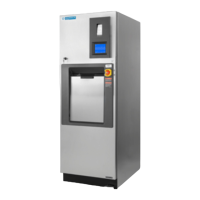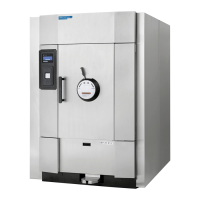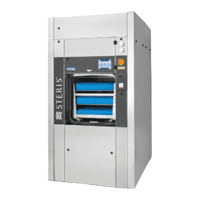Do you have a question about the Amsco Century and is the answer not in the manual?
Information related to Steris service and support.
Important notes and recommendations for sterilizer use.
Describes the intended applications and configurations of the sterilizer.
Warnings about electrical hazards and burns during operation and servicing.
Warnings regarding personal injury from bursting bottles during liquid cycles.
Procedures to prevent burns from hot bottles and fluids during liquid sterilization.
Warning that the sterilizer is not designed for flammable compounds.
Precautions to maintain dry floors in loading/unloading areas.
Emphasizes need for qualified personnel and preventive maintenance.
Potential compromise of load sterility if tests indicate problems.
Cautions regarding gasket retraction, vacuum depth, and cleaner usage.
A checklist to ensure the sterilizer installation is complete and correct.
Details on sterilizer dimensions, weight, utilities, and environment.
Specifies electrical service requirements and connections for the sterilizer.
Performing final checks on the sterilizer before operation.
Verifying unit power-up and performing a leak test cycle.
Provides the physical dimensions of the sterilizer in inches and millimeters.
Lists the weight of the sterilizer for different models.
Details the electrical and water utility requirements for the sterilizer.
Specifies the required ambient temperature, humidity, and pollution degree.
Provides general guidelines for sterilization and post-sterilization storage.
Details recommended parameters for prevacuum, gravity, and liquid cycles.
Information on items processed in the gravity cycle and its parameters.
Recommended parameters for sterilizing liquids and media.
Critical safety and procedural recommendations for liquid sterilization.
Strategies to optimize sterilization for various load types.
Methods for verifying the effectiveness of the sterilization process.
Guidance on using biological indicators for process verification.
How to test the air removal efficiency of prevacuum cycles.
Procedure for conducting the daily Dart (Bowie-Dick) test.
Performing the vacuum leak test to check system integrity.
Identifies the main power disconnect switch and its function.
Locates and explains the steam and water supply valves.
Overview of the sterilizer's main control panel.
Details on operating and programming the sterilizer via the touch screen.
Describes the printer's function, print formats, and operation.
Describes the control panel located on the unload end for double-door units.
Instructions for opening and closing the hinged sterilizer door.
Instructions for operating the horizontal-sliding sterilizer door.
Step-by-step guide for opening the sterilizer door in an emergency.
Explains touch screen operation and screen identification numbers.
Navigating menus to select processing and test cycles.
How to select preprogrammed processing cycles.
How to select and initiate test cycles like Leak Test and Dart Test.
Accessing functions that can be performed when the sterilizer is not running a cycle.
Essential daily checks and procedures before operating the sterilizer.
Procedures for loading and unloading using racks and shelves.
Step-by-step guide for loading the sterilizer chamber with a loading car.
Step-by-step guide for unloading the sterilizer chamber with a loading car.
Detailed instructions for operating the prevacuum cycle.
Detailed instructions for operating the gravity cycle.
Detailed instructions for operating the liquid cycle.
Procedure for performing the vacuum leak test cycle.
Procedure to prepare the chamber for the DART test.
Detailed instructions for performing the Dart (Bowie-Dick) Test cycle.
Procedure for ending a cycle prematurely due to selection error or malfunction.
Steps for entering the access code to unlock sterilizer usage.
Steps for entering the access code to access the Change Values menu.
How to navigate to the menu for modifying preset cycle values.
A step-by-step example of changing cycle values for a prevacuum cycle.
Steps to access the menu for modifying operating parameters.
Procedure for adjusting the sterilizer's programmed time and date settings.
How to adjust values that monitor the length of specific cycle phases.
Options for configuring units, signals, shutdown, and printer settings.
How to select temperature and pressure units for display and printouts.
Adjusting volume levels for alarm, end-of-cycle, and touchpad tones.
Programming automatic shutdown and restart of utility services to conserve energy.
Selecting the format for printing cycle data.
Enabling an additional printout of cycle data at the end of each cycle.
Option to disable all printer operations.
Overview of functions accessible when the sterilizer is not running a cycle.
Generating a printed record of the current chamber status.
Generating a duplicate printout of the last completed cycle.
Manually advancing the printer paper by one line.
Accessing the menu to program cycle values and operating parameters.
Viewing the current programmed cycle values and operating parameters.
Viewing the programmed values for a specific cycle.
Viewing the currently programmed time and date settings.
Viewing the programmed "too long in phase" values for cycle phases.
Viewing the currently programmed setup values.
Generating a printout of all programmed values.
Generating a printout of values changed since the last modification.
Generating a printout of values for a selected cycle.
Manually switching the sterilizer from operating to standby mode.
Viewing current temperature and pressure readings from sterilizer sensors.
Accessing the supervisory mode for advanced functions and settings.
Changing the customer name displayed on the sterilizer.
Changing the sterilizer identification number.
Resetting all cycle values and parameters to factory defaults.
Activating and programming access codes for menu access.
Viewing the programmed access codes for each operator.
Downloading cycle data to a computer or printer via the RS-232 port.
Overriding door interlocks for double-door units to allow simultaneous door opening.
A schedule outlining regular maintenance tasks and frequencies.
Procedure for cleaning the chamber drain strainer to prevent clogs.
Instructions for cleaning the interior of the sterilizer chamber.
Procedure for flushing the chamber drain line when it becomes clogged.
Step-by-step instructions for replacing the printer paper roll.
Procedure for replacing the printer ink cartridge when print quality degrades.
Procedure for replacing the sterilizer door gasket due to wear.
Overview of alarm conditions and touch screen operations during troubleshooting.
Example of an alarm screen, detailing its components and functions.
Example of a typical alarm printout generated by the sterilizer.
Describes alarms that may occur while a cycle is in progress.
An alarm indicating the chamber did not reach temperature in time.
Alarm for failure to exhaust the chamber to atmospheric pressure within the specified time.
Alarm for failure to reach the required evacuation level within the allotted time.
Alarm for failure to air break the vacuum to 2 inHg within the allotted time.
Alarm when chamber temperature drops below the sterilize temperature set point.
Alarm when chamber temperature exceeds the maximum sterilize temperature.
Alarm indicating low steam pressure in the door seal.
Alarm when chamber pressure or temperature readings are abnormal.
Alarm for a slow exhaust rate during the liquid cycle.
Alarm indicating a deviation between temperature probes.
Alarm related to the door switch engagement and state.
Alarm for the door switch not opening within the allotted time.
Alarm indicating pressure sensed in the chamber when not in a cycle.
Alarm indicating a communication failure with the display screen.
Alarm for atmospheric pressure deviation from the calibrated value.
Alarm indicating excess water sensed within the sterilizer chamber.
Alarm when the jacket temperature does not reach the set point within the allotted time.
Alarm for the door seal not reaching 5 psig within the allotted time.
Alarm for door seal pressure not dropping below 5 psig within the allotted time.
Alarm indicating a failure of the chamber pressure transducer.
Alarm indicating a failure of the chamber temperature probe.
Alarm indicating a failure of the jacket temperature probe.
Alarm related to the door switch engagement and state.
Overview of servicing procedures and safety precautions for technicians.
Procedure for replacing the sterilizer's bacterial air filter cartridge.
Instructions for cleaning strainers to maintain proper flow and pressure.
Procedure for replacing the steam trap assembly.
Cleaning valve seats or replacing check valves for proper operation.
Instructions for rebuilding solenoid valves using a repair kit.
Procedure for periodically testing the safety relief valve.
Guidance on ordering replacement parts and supplies.
Guidelines for the proper disposal of sterilizer waste materials.
| Category | Laboratory Equipment |
|---|---|
| Type | Steam Sterilizer |
| Sterilization Method | Steam |
| Control System | Microprocessor-based |
| Door Mechanism | Automatic, vertical sliding or hinged |
| Material | Stainless steel chamber |
| Power Requirements | Varies by model |


